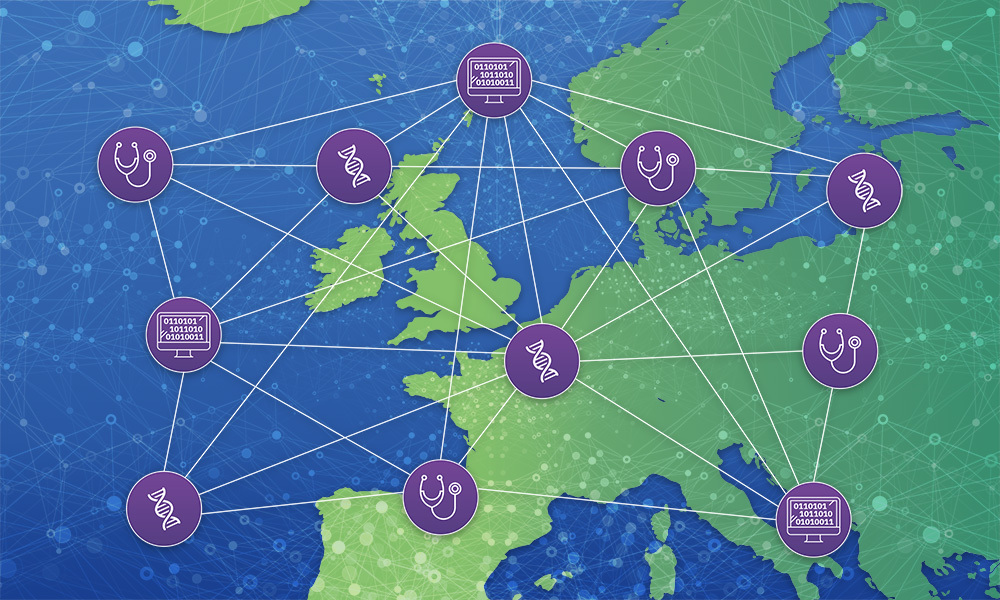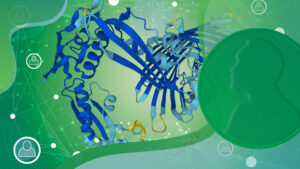
Genomic Data Infrastructure – integrating genomics into healthcare
New European Commission project will provide cross-borders access to at least one million genomes and related clinical data

The European Genomic Data Infrastructure (GDI) is a new €40 million ELIXIR-coordinated project, jointly funded by the European Commission, under the Digital Europe Programme, and participating Member States. The aim of the project is to enable secure access to human genomics and corresponding clinical data across Europe by creating data infrastructure.
EMBL’s European Bioinformatics Institute (EMBL-EBI) will support the GDI project in the development and implementation of common IT standards and operating procedures across the network. This builds on EMBL-EBI’s extensive experience sharing human genetic data through the European Genome-phenome Archive, a data resource for permanent archiving and distribution of personally identifiable genetic and phenotypic data resulting from biomedical research projects. The EGA has recently adopted a federated model, working with institutes from five European countries to improve the way researchers find and access human genomic data. EMBL-EBI will build on this work to support the GDI initiative.
Digital infrastructure for health data
The GDI project will facilitate a cross-border federated network of national genome collections for biomedical research and personalised medicine solutions.
Building on the preparatory work of 1+ Million Genomes (1+MG) working groups and the Beyond 1 Million Genomes (B1MG) project, GDI brings 20 EU Member States together with two infrastructure organisations (BBMRI and EMBL) to work collectively to support the 1+MG Initiative’s vision to facilitate better healthcare for citizens in Europe by providing cross-border access to at least one million genomes and related clinical data.
A step towards personalised medicine
The GDI project aims to unlock a data network of over one million genome sequences for research and clinical reference. This will create unprecedented opportunities for transnational and multi-stakeholder actions in personalised medicine for common, rare, and infectious diseases.
Authorised data users, such as clinicians, researchers, and innovators, will be able to advance understanding of genomics for more precise and faster clinical decision-making, diagnostics, treatments, and predictive medicine, and for improved public health measures to benefit European citizens, healthcare systems, and the overall economy.
“Genomes will soon be generated more routinely as part of healthcare,” explained Serena Scollen, the GDI Coordinator and Head of ELIXIR Human Genomics and Translational Data team. “To realise the full promise of genomics and its implementation into healthcare, it is critical to facilitate research and innovation and integrate findings into the clinic and healthcare. One of the biggest challenges we face is the lack of infrastructure – needed to support the discovery, access, sharing and analysis of human genomics data on a massive scale. By working together, countries will be able to deploy infrastructure to facilitate secure cross-border data access. Ultimately the benefit will be for the citizens of Europe and through shared learnings and improved healthcare, citizens globally.”
Three key pillars
As a critical component of Europe’s ambition to lead the integration of genomics into healthcare, the GDI project will make data accessible for research, clinical reference, and policy development uses through three key ‘pillars’:
- Long-term sustainability – bringing together country representatives to agree on a long-term governance model, a legal framework, and financial plan for the infrastructure. This ensures the infrastructure continues to operate after the end of the project.
- 1+MG infrastructure deployment – increasing the interoperability of European data resources. This will ensure the resources can operate as part of the 1+MG infrastructures, and are ready to access once the required agreements are in place.
- Use cases – working with users like clinicians, researchers, and innovators to identify solutions that could form part of the infrastructure.
“The GDI is an ambitious project to build a collaborative European network for sharing healthcare genetic data for research,” said Thomas Keane, Team Leader at EMBL-EBI, who is involved in the GDI project. “Supporting the GDI project will fulfil a key mission of EMBL to develop European infrastructure for safely sharing human genetic data between researchers. EMBL-EBI will provide expertise and knowledge from the European Genome-phenome Archive.”
Read the original press release on the GDI website.


